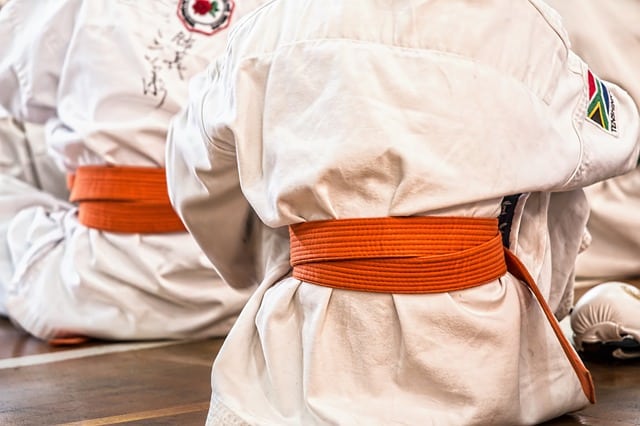
Normal vs. common | Learning in the loud moms’ corner
I’m not much of a gym fan—I’ve flirted with them before, even had (always brief) love affairs with them, but I always return to working out at and from home.
When we lived in California, it was easy to get enough exercise outdoors year round. When we moved to Michigan (before we had Kermit the Dog and the kids were younger), it got a bit more difficult.
 I needed to move more, my daughter was not being particularly active, and after a few months of sitting and watching my son’s martial arts classes and feeling like I was wasting a precious hour of my time, I figured it would be fun for us to join the family class—I’d get a workout in and spend some quality time with the kids.
I needed to move more, my daughter was not being particularly active, and after a few months of sitting and watching my son’s martial arts classes and feeling like I was wasting a precious hour of my time, I figured it would be fun for us to join the family class—I’d get a workout in and spend some quality time with the kids.
I felt pretty ridiculous at first (especially since many times I was the only mom—and an older one at that), but apparently I didn’t look too bad—a few others gradually joined.
We were generally lumped together at the back of the room, and we became known as “the loud moms’ corner.” It might have been because we were happy to yell with abandon when it was required. Or it might have been because we were so happy to be in community with other women that we couldn’t shut up?
We did our best to keep up with our kids: for the most part, it was a bit harder to learn the complicated forms, remember the terms, and break the boards without being concerned about breaking some bones in the process.
We joked that our practicing Taekwondo was really good for the kids: they didn’t bear the brunt of our end-of-the-workday ill humor when we were exhausted from breaking things and yelling in class.
We worked hard and laughed a lot—which sometimes proved problematic because, well, because pelvic floor health…or lack thereof.
Heard before the warm-up running: “Did you bring the Depends?”
And after the innumerable jumping jacks: “It’s always funnier if you leak a little.”
 And there you have it: yet another symptom of middle age that is so common that it’s accepted as perfectly normal—so normal that it can be funny.
And there you have it: yet another symptom of middle age that is so common that it’s accepted as perfectly normal—so normal that it can be funny.
The first time most women learn about pelvic floor health is during pregnancy, when we are warned that if we don’t do our Kegels, we’re probably going to experience some problems with incontinence toward the end of our nine months. We’re rarely told that the issue might either last after pregnancy or reappear later in our lives.
And when we get to perimenopause and experience the same issue, it’s blamed on our stage of life and our hormonal shifts.
But what if it’s not just aging and hormones?
In my search for resources for the (Sorta) Secret Sisterhood, I came across some great information on the topic of pelvic floor health in The Ultimate Perimenopause Podcast as well as in some wonderful women who have agreed to do a Q+A for the membership—you’ll hear more about them later!
We are amazingly complex life forms: yes, pregnancy and middle age can bring changes to our bodies … and these are “big crises” in the sense that they are pretty obvious.
What we often neglect to notice are the many smaller stressors—such as poor posture and other “bad habits”—that can contribute to poor outcomes down the line.
Because the topic is foremost in my mind just now, I think about my dental problems again. It seems like the beginning of a bad joke: what can 2 dentists, 2 endodontists, and 1 periodontist agree on? It turns out there are two things!
- Braces can wreak havoc on the roots of our teeth (a major stressor over a relatively short period of time)—why is this not mentioned—or is it simply downplayed—by orthodontists?
- Clenching our jaws 24/7 (a less noticeable stressor over a long period of time) can cause even more trouble—why is our medical model to fix the presenting problem rather than refer us to an osteopath, chiropractor, physical therapist, or restorative exercise professional who can help with the cause?
As a health coach, I’m always asking questions, and I thought I’d share some of my favorites with you for when you find yourself struggling with any health issue—physical, mental, emotional, or spiritual!
- Are you looking at a situation/condition that is common or normal?
- Are you considering as many connections as possible between what you are going through now and all you’ve experienced in your life so far?
- Are you looking for a way to alleviate symptoms or address their cause—and if the former, what impact will this have down the line?
I hope these questions—just a few of those I explore with my clients—provide you with some insight and guidance if you are trying to be intentional about your health journey.
If you’re facing some of the issues that may happen for us women at mid-life, I hope you’ll consider joining the (Sorta) Secret Sisterhood—the Big Sisters and the Sneak Peekers are “in the house” already; clubhouse doors officially open July 1, 2018!



